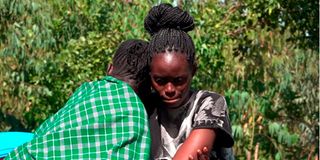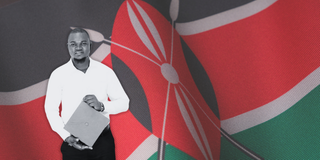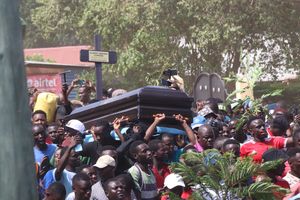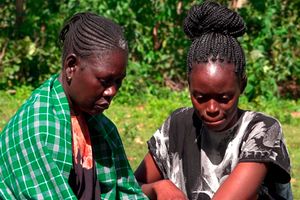
Albert Ojwang's mother Eucabeth Adhiambo Ojwang (left) with his widow Nevinina Onyango Omondi at their home in Kokoth Village, Homa Bay County on June 9, 2025.
The advent of smartphones and social media has revolutionised the way people capture and disseminate information, with videos and opinions capable of reaching thousands within moments.
This digital transformation has exposed cultural practices once confined to oral tradition, rituals previously known only through whispered accounts now play out before global audiences.
One such tradition pertains to burial rites within certain Kenyan communities.
A longstanding custom requires close family members of the deceased person to cast a handful of earth onto the coffin just before the grave is covered with soil.
This act symbolises the return of the deceased to the earth, in accordance with Genesis 3:19: "For dust you are and to dust you will return."

Mourners view the body of Albert Ojwang at Nyawango Primary School in Kabondo Kasipul, Homa Bay County on July 4, 2025.
Christian clerics often recite this verse during the ritual.
However, some recent videos shared online have shown the ritual being enforced in unsettling ways, particularly on widows.
In March this year, Mellen Mogaka was filmed being physically assaulted by men after allegedly refusing to perform the ritual at her husband Joseph Osoro’s burial in Kisii County.
More recently, on Friday, July 4, a video circulated showing Ms Nevnina Onyango, widow of the late blogger teacher Albert Ojwang’, failing to cast soil into her husband’s grave in Kakoth Village, Homa Bay County. Her omission sparked fierce public discourse, with varied interpretations flooding social media.
Within the Luo community, this burial act symbolically binds a widow to her marital home, preventing her from remarrying outside the family. Ms Onyango’s reluctance was thus widely construed as a sign she might sever ties with her late husband’s kin.
However, speaking through one of her husband’s uncles, Joseph Okumu, the widow explained that she was overwhelmed by overwhelming grief and confusion during the burial.
“I had no strength to perform the ritual. There was too much happening, hence I couldn’t process it all. I am married here and I have no intention of leaving. With time, I will prove this,” she explained and pledged to continue collaborating with the family.

The mysterious death of teacher Albert Ojwang in a police cell has sparked widespread national outrage.
Mr Okumu acknowledged the family was equally surprised by the incident, having only become aware of it through the video.
He condemned the rush to judgment.
“People are speculating a lot, including fabrications. We are trying to focus on justice for our son’s death, not rumours,” he said.
He affirmed that Ms Onyango remains a part of the family and is free to live as she pleases.
“She has a son with Ojwang’ and is still our daughter-in-law. We do not fear she will leave,” he said.
From a cultural standpoint, views vary.
Mr Nyandiko Ongadi, a leader within a faction of the Luo Council of Elders, explained that a widow is only expected to partake in the soil ritual if she was formally married, defined by the exchange of cattle, or bride price, between the families.
“Without this, the man is considered a boyfriend, not a husband,” he said.
However, Mr Ongadi goes on to explain that should a woman decline to participate in the ritual despite a formal marriage, she may be perceived as concealing deeper motives.
Mr Jarongo Okumu, an elder from Kanyamwa in Ndhiwa, supported this position.
Read: Ojwang death: Police boss Kanja confirms DIG Lagat was complainant that led to blogger's arrest
He noted that a widow is only permitted to cast soil into one grave, her first husband's.
Even if she remarries, the rite is not repeated.
Posthumous marriages are also recognised.
If a man dies before fulfilling dowry obligations, his kin may offer cattle after his death to formalise the marriage and retain the widow within the family structure.
The practice is not exclusive to the Luos.
In neighbouring Gusii communities and among the Suba people, similar rites are observed, although with varying levels of strictness.
Mr Joab Ikawa, Secretary of the Suba Council of Elders, noted that the Suba only adopted the ritual decades ago due to intermarriage with the Luo.
“It depends on which culture dominates the marriage. In homes where Luo customs prevail, the ritual is observed,” he explained.
While the act of placing soil on a grave may appear simple, its cultural and emotional weight is immense. As social media continues to expose intimate moments of mourning, the collision between tradition, personal grief and public scrutiny becomes increasingly pronounced.
[email protected]






